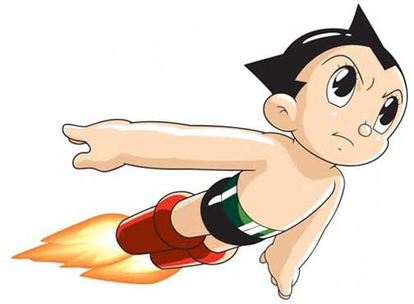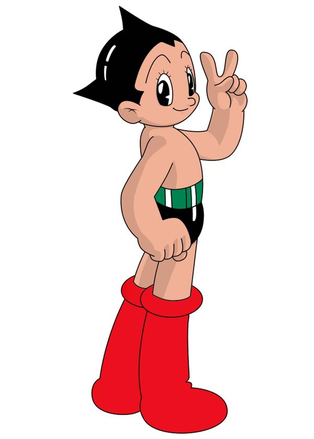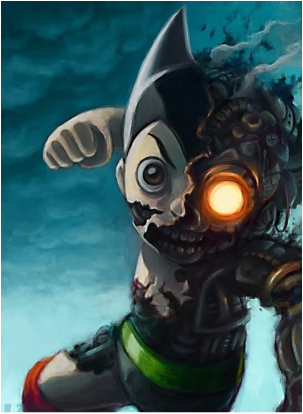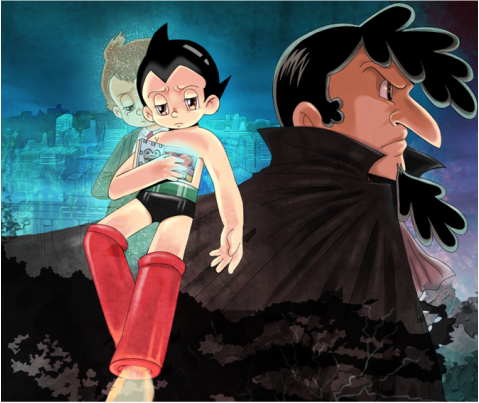Why An Astroboy Will Endure While An Ash Ketchum Will Die - An Ode To The Legacy Of Astroboy6/11/2015 by Devanjali Banerjee Astro Boy, or Mighty Atom, is a long-running and beloved story of Japan’s very own superhero who is actually a robot with a heart of gold (this may just be literally true, take heed.) Written by Osamu Tezuka with the intention of educating children about science, technology as well as socio-moral questions, this Japanese comic series has amassed global recognition. So let’s cut to the origin story. Set in the near future where robots have become so technologically advanced that human society is forced to acknowledge their sentience legally by enacting laws, the age of Astro Boy is one fraught with great struggle between “robotkind” and humankind. Cut to the death of a young boy called Tobio, whose bereavement leaves his father, Doctor Tenma distraught and desperate. A scientist working at the Ministry of Science, he undertakes a Frankenstein-like project and recreates a robot-avatar of Tobio. While resembling Tobio in every respect, the robot never ages because well, he WAS a robot and not human. This fatal flaw was to trouble him for the rest of his days (read, bad parenting for an unplanned kid) Astro Boy, as he is later known, is then sold into a robot circus by Tenma, where he is rescued by Professor Ochanomizu. It is under his tutelage that he grows to become the hero he is. The stories vary in length, and are, for the most part, episodic and self-contained. In the relevant origin volume (volume 1) reviewed, there is one entitled Plant People. On discovering a plant buried in the snow of a mountain, Astro Boy’s friends wonder how it ended up in such an unlikely spot. Perhaps with a touch of sadness and empathy, he relates the story of how aliens from planet Seloa 12 crash-landed onto earth in search of water, as their own planet had died. Hostile and dangerous, these aliens use hundreds of saucers to suck up more than half the planet’s water. Astro Boy, with the help of a Seloan, finally freezes the saucers and saves the planet from potential destruction. The lone Seloan however, on the verge of death, reveals his true form as a “plant” and literally takes root on the earth. It is this very plant that Astro Boy’s friends were examining with such wonder. This particular story is one of great pathos and emotion, especially for Astro Boy because he too feels alone because of his highly developed brain power which puts him in an uncomfortable limbo - half robot or half man? But pathos and emotions aside, from a lawyer’s perspective, I find the relationship between superheroes and the law to be very engaging. Do you pay a superhero tax when your city has a resident Batman? Will a citizen get compensation when their condo is destroyed by Superman whilst battling with General Zod, or will superhero immunity prevail? And whose tax-payer money is going to be used to clean up Spiderman’s webs? So, with respect to superheroes in general and Astro Boy in particular, the oft-misquoted aphorism by Voltaire (no, Uncle Ben didn’t say it first) comes to mind, “With great power, comes great responsibility.” But how do superheroes (or even super-robots like Astro Boy) fit into the rubric of society especially in relation to law and justice? Are they really accountable or responsible the way they are portrayed to be? Are they above the law? Or is the law below them? A dizzying number of questions come to mind and phrases such as “vigilante justice” and “lack of accountability” seem to snicker at one’s unflinching urge to hold up one’s heroes against these indefensible claims. However, the simple fact is that although Astro Boy is living as an ordinary robot in future Japan, and is a citizen by virtue of the laws of the land, he is still no ordinary being. Astro Boy is not an ordinary civilian and his acts prove exactly how heroic he is. By rescuing the human race from natural disasters, enemy aliens (and for once, this phrase is used EXACTLY the way popular culture wishes it to be used), and frequently, humanity itself, Astro Boy goes to the lengths that normal law enforcement and justice would not go .Where angels fear to tread, Astro Boy seeks to go. And that is why superheroes are outside the ambit of justice, not because they are not accountable to our laws but because they must be accountable to different standards that the public sets for them. Remember, the difference between a vigilante and a superhero is public acclaim and Astro Boy remains firmly affixed in our hearts and minds. My own experience with Astro Boy dates back to the times when Animax was the only source of anime and the token of currency was Pokeman paraphernalia (that trend spawned Duel Masters, Digimon and Beyblade collectibles- but that’s a story for another day). In the midst of all the Pokemon and Digimon out there, Astro Boy swept me off my feet - it was like nothing I’d ever encountered before. Years later I realize what it was that Astro Boy had, that other contemporary shows didn't - poignancy. Now, I generalize greatly here, but indulge me - almost all such superhero series tend to have protagonists that are some form of outcasts, who acquire certain critical skills due to “fateful” circumstances (read: plot direction) and cutting across past plot-heavy sequences, we see the naysayers welcoming the protagonist back with open arms and gratitude. Redemption-heavy, these shows tend to be one-dimensional and ignore the psychological implications of superhero-ness; but this was an expected, predictable flaw in shows that cater to the demands of preteens and adolescents. Astro Boy, however was ahead of its time in both senses of the phrase. That the Pinocchio-like protagonist would never really be human, that he would never really be accepted into human society no matter how many villains he eliminated, was a fact that Astro Boy never really forgot. Suffering obvious abandonment issues from when Tenma both created and rejected him, he does not do the same injustice to mankind. He redeems himself not by abandoning them in their time of need, but by rescuing them time and time again, although they are the same humans who classify him as an unnatural aberration. And that’s why Astro Boy will always be my first superhero. Therefore with his metallic underwear suitably outside (mostly because he ONLY wears underpants) like most superheroes, Astro Boy remains an eminently readable manga. One is rarely patronized while reading this manga, a feat quite impossible seeing as it’s written FOR children and a point that is in favour of the series. This is an absolute classic for any science-fiction nerd, so try not to miss out on this one- it comes at you with 100,000 horsepower of sheer power-packed fun.
Follow us on Facebook and Instagram to be notified whenever we release new articles.
Do you use an RSS reader? Even better!
0 Comments
Leave a Reply. |
Categories
All
Archives
December 2022
|




 RSS Feed
RSS Feed
